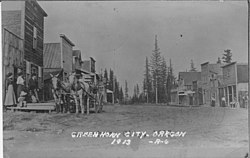Greenhorn, Oregon
Greenhorn, Oregon | |
|---|---|
 Greenhorn in 1913 | |
 Location in Oregon | |
| Coordinates: 44°42′31″N 118°29′48″W / 44.70861°N 118.49667°W | |
| Country | United States |
| State | Oregon |
| Counties | Baker, Grant |
| Incorporated | 1903 |
| Government | |
| • Mayor | Dennis Koellermeier[1] |
| Area | |
| • City | 0.09 sq mi (0.22 km2) |
| • Land | 0.09 sq mi (0.22 km2) |
| • Water | 0.00 sq mi (0.00 km2) |
| Elevation | 6,296 ft (1,919 m) |
| Population | |
| • City | 3 |
| • Density | 34.88/sq mi (13.47/km2) |
| • Urban | 0 |
| • Metro | 2 |
| Time zone | UTC-8 (Pacific) |
| • Summer (DST) | UTC-7 (Pacific) |
| ZIP code | 97877 |
| Area code(s) | 458 and 541 |
| FIPS code | 41-31050[5] |
| GNIS feature ID | 2410658[3] |
Greenhorn is a nearly non-populated city in Baker and Grant counties in the U.S. state of Oregon. It straddles the Blue Mountain ridge, so that it is located in both Grant County and Baker County. As most of the city is situated in Baker County, and the early residents considered Baker City to be more convenient, for administrative purposes it is considered to be in Baker County.
As of the 2000 census, the city had a total population of 0, with 7 housing units. As of the 2010 census, the population was 0, with 10 housing units.[6] The population had increased to 3 by 2020.[7]
History
[edit]
Greenhorn was first populated in the 1860s as miners prospected for gold in the area. It was platted in 1904, though it lost two-thirds of its population between 1900 and 1910.[8] The mining district was composed first of placer mines, but soon many lode gold mines developed. The city was incorporated in 1903 and had a population of 28 in 1910.[9] It continued as a viable community until 1942 when gold mining was made illegal by Federal Public Law 208 during World War II.
In later years, the old Greenhorn Jail (dating to around 1910) was removed to Canyon City under suspicious circumstances. A court case ensued for its return, but because the city straddles the Blue Mountain ridge, the district attorneys of Baker County and Grant County could not even agree in which court house it should be held. The case was eventually heard by the Circuit Court for Grant County in Canyon City, Oregon. The jail remains in Canyon City, Oregon.[citation needed]
Geography
[edit]According to the United States Census Bureau, the city has a total area of 0.1 square miles (0.26 km2), all land.[10]
The city is in the Greenhorn Mountains, a small range within the broader Blue Mountains, and is surrounded by the Malheur National Forest and Wallowa–Whitman National Forest.
At 6,296 feet (1,919 m) above sea level,[3] Greenhorn is the highest incorporated city in Oregon.[11] It is also unique in that the city was established on land that was originally patented from the United States for the purpose of platting the city (rather than being homesteaded by individuals). (See Town of Greenhorn v. Baker County, 596 F2D 349.)

Demographics
[edit]| Census | Pop. | Note | %± |
|---|---|---|---|
| 2020 | 3 | — | |
| U.S. Decennial Census[12][4] | |||
As of the census of 2000, there were no people living in the city.[13] The same was true in 2010.[6] As of 2013, the Baker City Herald reported that Greenhorn had two "year-round" residents.[14] The Herald reported at that time that the community had about 13 cabins and 20 part-time residents.[14]
Government
[edit]As of 2015, Zack Koellermeier and Brad Poyser of Oregon City, Nathan Wright of La Grande, and Keith Rofinot of Tigard serve on the city council.[14] Mayor Dale McLouth lives in Molalla.[14]
See also
[edit]References
[edit]- ^ "Incorporated Cities: Greenhorn". Oregon Blue Book. Oregon Secretary of State. Retrieved May 24, 2024.
- ^ "ArcGIS REST Services Directory". United States Census Bureau. Retrieved October 12, 2022.
- ^ a b c U.S. Geological Survey Geographic Names Information System: Greenhorn, Oregon
- ^ a b "Census Population API". United States Census Bureau. Retrieved October 12, 2022.
- ^ "Greenhorn". United States Census Bureau. U.S. Census Bureau. Retrieved July 28, 2013.
- ^ a b "Population and Housing Occupancy Status 2010". U.S. Census Bureau. Retrieved July 28, 2013.[dead link]
- ^ https://api.census.gov/data/2020/dec/pl?get=P1_001N,NAME&for=place:*&in=state:41&key=5ccd0821c15d9f4520e2dcc0f8d92b2ec9336108 [bare URL]
- ^ Bailey, Barbara Ruth (1982). Main Street: Northeastern Oregon. Oregon Historical Society. p. 21. ISBN 0-87595-073-6.
- ^ Benson, Frank; Olcott, Ben (1911). 1911 Oregon Blue Book. Salem Oregon: Willis Duniway, State printer. p. 114.
- ^ "U.S. Gazetteer: 2010, 2000, and 1990". U.S. Census Bureau. Retrieved July 28, 2013.
- ^ Bishop, Ellen. "Greenhorn Mountains". The Oregon Encyclopedia. Oregon Historical Society. Retrieved February 2, 2021.
- ^ "Census of Population and Housing". Census.gov. Retrieved June 4, 2016.
- ^ "Census 2000 Gazetteer Files". U.S. Census Bureau. April 3, 2013. Retrieved July 28, 2013.
- ^ a b c d Collins, Chris (August 23, 2013). "Firefighters Bring Comfort to Wary Greenhorn Residents". Baker City Herald. Archived from the original on February 17, 2015. Retrieved February 17, 2015.
External links
[edit]- Entry for Greenhorn in the Oregon Blue Book
- Cockle, Richard (June 15, 2008). "Oregon's smallest city a mile high gold rush town". The Oregonian.
- Ghost town of Greenhorn Oregon from PNWPhotoblog.com


